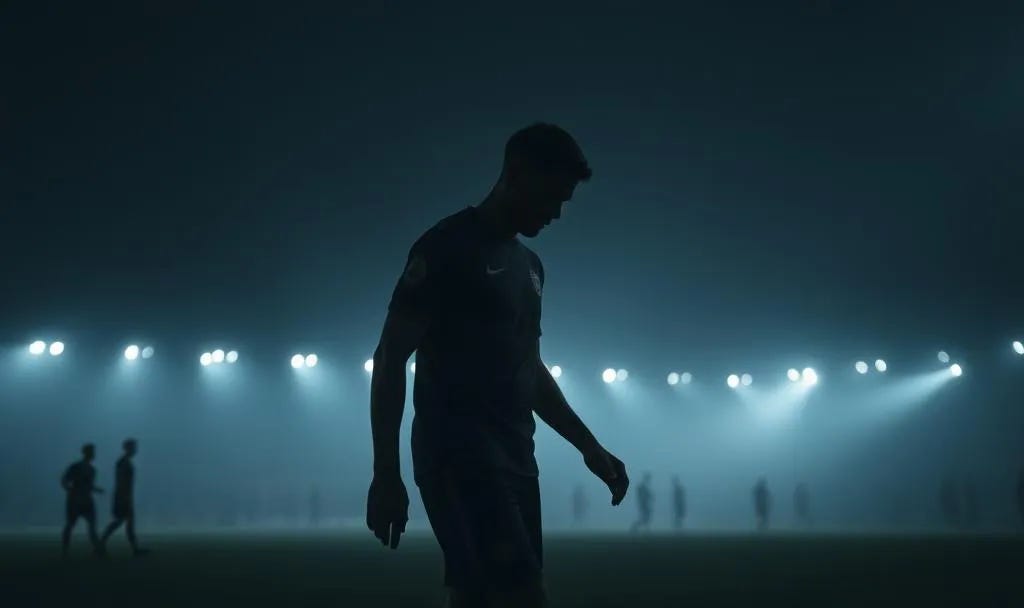A Footballer Dies Twice
99% of young footballers don’t ‘make it.’ What happens once they’re released?
There is a saying in sport: an athlete dies twice. The first death comes when their sporting career ends.
My career’s over. Life’s done. What’s the point in living now?
That’s how one participant described his release in our study. Others called it ‘heartbreaking,’ the ‘ultimate setback,’ and the ‘worst experience’ of their lives.
Such emotional distress is no surprise. Children as young as five enter academies, investing their entire childhood into one goal – to ‘make it’ as a professional footballer. Yet the overwhelming majority leave the system by 18, or within a couple of years after signing professional forms.
The high turnover, along with a system that treats young players as marketable assets rather than individuals, has led to UK football clubs and their academies being labelled as Football Factories.
Other research backs up just how traumatic release is. For example, a 2016 study by Blakelock and colleagues found that recently released young players suffer from clinical levels of psychological distress – with anxiety, depression, and a loss of confidence all listed.
A 2022 study by McGlinchey and colleagues further evidences the ‘traumatic experience’ young players face once released. One participant put it simply: players go ‘from everything to nothing in a split second.’
Why is release so devastating?
When young players exit professional football, they don’t just lose their job – they lose their whole identity. One they’ve built up since childhood.
From the moment a young person signs for an academy, they aren’t just playing football. They become ‘The footballer.’ Everything in their life revolves around it – sacrifices, extra training, extra dedication, to ‘give yourself the best possible chance of making it.’
I was ‘Ryan, the footballer’, and I think I felt like that as well. I definitely felt that was the only thing I was going to do and everything I was doing in my life was for that.
In addition, our participants spoke of the boost in status and attention they received growing up. Teachers ask you more questions, peers want to be your friend, girls want to get to know you, and people start giving you special treatment – as one participant remarked:
I suppose you feel a bit superior, like almost like a little celebrity around the area.
The eternal need for approval, connection and purpose were all filled by football. And gradually their self-worth became tied to their footballer identity. Over time, football started dominating their lives, and there was little need to focus on anything else.
This is called Athletic Identity Foreclosure – where a young person is strongly committed to their athletic role, and they neglect exploring other interests or aspects of themselves.
On one hand, athletic identity foreclosure is crucial for sporting development, aiding performance and motivation for sport. On another, it may prevent key developmental experiences and block healthy exploration of who they are outside of football.
The hidden reality within academy football
However, once you have been released, revolving your identity around football may not have been the best bet – especially when we look at the odds.
Fewer than 1% of academy footballers ‘make it’ as a professional footballer.
Even among players who secure a scholarship aged 16, 85% are released within two years. A 2012 study by Dr Chris Platts, tracked 303 academy players. It was later found that only four were still playing professional football five years later. And Sky Sports estimates that ‘only six in every 10,000 make the grade.’
If you're a parent or player, these are the statistics that football clubs (and anyone attached to making money from youth football) don't really want you to see.
For a less than 1% chance, how many families would rethink the commitment? Five trips a week to the training ground. The ups and downs of academy life. The disruption to your child’s life. Let alone the rest of your family or other children. And is it fair to place your child’s self-worth into ‘making it’ when the odds are stacked so heavily against them?
The system undeniably invests in its youth players. But a hidden truth within football is that clubs need your child – not because they believe they will make it – but because they need full squads to support the few they think will.
Coaches call these supporting acts ‘facilitator players.’ And that’s the reality for most youth players up and down the country. ‘95% of the group is just used as cannon fodder,’ as one of our participants put it, ‘for this one potential talent to get to the first team.’
And yes, all statistics have their limitations. Even 50% would be concerning. But whether it’s 94%, 97%, or 99%, the message is clear: the overwhelming majority are released. That's the reality of professional football – not everyone can make it. What truly matters is how the system treats the majority who don’t, and the real impact release has on young players up and down the country, year after year.
You had to be all in
Given the statistics, you’d think it would be ethical for clubs to help develop other skills and interests that promote well-rounded people. Things that set you up for life beyond football. And we know there are some brilliant player care and club staff at clubs who do great work.
But our participants found it was the opposite. Their clubs didn't just allow their identities to foreclose around football – they encouraged it.
Participants were banned from other sports, and training regimes meant they had no time for normal teenage life. Education was also treated as an afterthought, or actively discouraged. One player recounted his academy manager’s views:
He brought us all in the office and said to us that we’re here to play football, and realistically, education should be put to one side: ‘f*ck education!’
Although participants spoke of being heavily invested in football because they loved the game, they also spoke of how they feared the clubs would label them with ‘bad attitudes’ if they didn’t conform. The message was clear – you had to be all in.
It was later recognised by participants, that this came at a cost:
I kind of gave up everything to play football.
There are so many other things that are out there that we haven’t explored because all we’ve done is played football.
The collapse of identity
Wider research says that people with multiple differing identities (e.g., athlete, runner, musician, artist, student) are more resilient to setbacks and manage negative life events better, compared to those with one dominant identity. Why? Because these identities act as psychological pillars, providing stability and support when one part of your life falls down.
For some of our participants, football was their only pillar. And when they were released, it felt like losing everything.
The structure and routine of full-time football disappeared. The sense of belonging and connection from their club and teammates vanished. Support systems that were around for years dissolved overnight. Their competency questioned, and confidence shattered. And their life's purpose suddenly felt meaningless.
It all comes crashing down around you.
They lost their footballer identity. And with it went the roles, routines, relationships, and goals that shaped who they were for so long. The self-worth tied to their identity vanished with it too.
I’m no longer ‘Ryan the footballer’. . . I’m now just like an average Joe.
Our research suggests that the collapse of this footballer identity underpins the psychological distress many young players face after being released.
This ‘footballer’ identity, formed and reinforced since childhood, has been central in shaping how they view themselves and how they move through the world. Football has dominated their lives for so long that other interests or identities haven’t had the chance to develop. And once they lose access to this identity, they have little else to fall back on.
Put differently, there are no other psychological pillars to keep their structure standing. So their entire world collapses.
This is how they experience their first death – and it's a breeding ground for mental health issues, and poor coping mechanisms.
A system built for clubs, not players
This leaves us with a conundrum – are academies fit for purpose?
Armies of young boys are spending their entire childhood and teenage years invested in ‘making it.’ Yet, the odds suggest release is inevitable and their efforts will be futile.
If clubs were honest about the odds, how many parents would sacrifice their child's education, social life, and mental well-being? All for a less than 1% chance?
But the club's best interests are full squads and committed players – to keep the dream alive – for as long as they need you.
At best, this is manipulation, and at worst, it’s exploitation.
Ultimately, it’s a system that benefits the football club and the few who succeed, while disregarding the majority who spend years in the system only to get released.
Simply put – is developing a Phil Foden, or a Marcus Rashford, worth sacrificing the well-being of thousands of young people each season?
Or is it okay to see these young men as necessary collateral damage, so the ‘beautiful’ game can go on?
But does release always bring devastation?
I originally thought so. But some of our other participants experienced something unexpected – something that challenges the usual narrative around release.
We explore this surprising finding in the next article.
If you’ve been impacted by the football system, and want to share your story, email me at: contact@johnnygorman.com






Really strong article Johnny, beautifully worded - couldn't capture it any better, raises real strong questions around the football factory and if this risk out ways the rewards for the industry / system (Gee said it’s an amazing article)
Very good article. It’s particularly sad about the loss of identity lads feel after throwing everything at football during their teenage years. There should definitely be help programmes for young players to develop a coping mechanism for this
Well written mate and I’m looking forward to the next bit